👋 Hey, I’m George Chasiotis. Welcome to GrowthWaves, your weekly dose of B2B growth insights—featuring powerful case studies, emerging trends, and unconventional strategies you won’t find anywhere else.
This GrowthWaves note is brought to you by Vizard.
We used to waste so much money and much time on our social media videos.
Not anymore, because we’ve started using Vizard.
Vizard allows you to:
Detect the best moments in your video using AI (audio, visuals, and emotions)
Connect your social accounts and publish instantly—no downloads needed
Repurpose existing content (webinars, podcasts, etc.) in seconds
Plan and schedule content with Vizard’s auto-posting feature
Generate captions and translations to boost engagement
Turn long-form videos into viral clips seamlessly
And so much more
It will save you money and time, and it will help you level up your video game.
We’re using it internally (here’s an example), which is why I’m recommending it.
If you want to try it out, visit their website and use ‘GROWTHWAVES‘ at checkout for a 5% discount on all payments within the first year.
In the past 2+ years, SEO has gotten a bad reputation. Interestingly, a big part of it is fueled by industry people, which surprises me.
Marketing has had a love/hate relationship with SEO for years. Many people talk about SEO negatively online, only to rely on it to drive traffic, leads, pipeline, and sales and hit their quarterly goals.
Still, lately, you’ll see mostly the hateful side of the relationship communicated online and a general negative sentiment toward SEO.
SEO is simply not as sexy as it used to be, and for a good reason. But that reason might not be exactly what you’d expect.
In this note series (this is part 1 of the 2), I’ll try to explain how SEO got a bad name for itself (to the point of being politically incorrect) and provide a mental framework for thinking about traffic loss factors and SEO potential moving forward.
Before we begin, a disclaimer:
Over the years, my other company, Minuttia, has relied on SEO to drive client results. SEO isn’t all we do, but it’s one of the vehicles we use to drive business growth. I’m also actively investing in companies in the SEO space. So, naturally, I’m positively biased toward the channel, which will be reflected in my writing.
The current state of things
The slide below is part of my upcoming talk for the SERP Conf in Sofia, Bulgaria.
From Gartner to media publications and individuals on social media, the negative sentiment toward SEO has spiraled out of control.
SEO is dead in the water. It doesn’t exist. Companies shouldn’t invest in it. (But, of course, they’ve got to invest somewhere.)
The problem with many (if not most) of these content pieces, opinions, etc., is that they’re powered by a specific agenda.
An example:
Gartner is a respectful organization that does research and provides unique insights for the enterprise. It forms opinions and (rest assured) affects people’s lives in ways you can’t imagine.
A headline like the following…
“Gartner Predicts Search Engine Volume Will Drop 25% By 2026, Due to AI Chatbots and Other Virtual Agents”
… does more damage to the SEO industry than most Google updates ever will.
Why?
Because it’s designed to hook the CMO of a company that traditionally invests in SEO and tell them that:
“SEO (the channel) isn’t worth it any longer, and you should pull back with your SEO investment. Ah, and by the way, if you want to know what you need to invest in, you should buy our reports.”
Does that sound unbiased to you? Of course, everyone is entitled to their opinions as long as they’re not offensive, harmful, etc.
But rest assured that a report like this (and that’s just one of the examples, of course) is enough to cut spending and re-allocate marketing budgets within companies. In other words, it forms opinions and drives decisions.
Okay, but there must be some truth to all that. Not everyone has a hidden agenda and is biased toward a specific direction or outcome (in this case, to prove that SEO is dead).
How did we get here?
Again, the slide below is part of my upcoming talk for the SERP Conf in Sofia, Bulgaria.
With the benefit of retrospect, I can trace the beginnings of SEO’s cancellation effort back to November 30, 2022, the date of ChatGPT’s launch.
Since then, a series of events (e.g., Google rolling out AI Overviews) have impacted SEO both on a perception and a practical level.
The practical implications are real, by the way. For example, according to a meta-study of 19 studies by
for his Growth Memo newsletter:“… we can conclude for now that AIOs occupy informational, long-tail queries with low search volume and negatively impact click-through rates unless you’re part of the citations.”
So, some of the events of the past 2+ years have indeed affected (negatively) the core incentive behind SEO (read: traffic generation).
Some of them, though, had an impact primarily on a perception level rather than a practical one.
Where does perception stop, and where does reality kick in, though?
Some data (and a reality check)
In the past 2+ years, the changes and rapid evolvement of the search engine landscape have pushed several companies and individuals to conduct research and make a meaningful contribution to the marketing industry.
Here’s a list of data points I’d like you to skim through quickly:
In 2024, Google was the most popular internet service (Cloudflare)
In 2024, Google served more than 5 trillion searches, and grew 21.64% YoY (Google) (SparkToro)
Active American desktop web users in 2024 performed, on average, 126 unique Google searches each month (SparkToro)
Google dominates search with 83.54% market share on online searches; YouTube comes second and ChatGPT third (Datos)
ChatGPT leads the AI search category; Gemini comes in second, with Copilot third, and Claude and Perplexity bringing up the rear. (Datos)
In 2024, Google received ~373 times as many searches as ChatGPT. (SparkToro)
ChatGPT's referral traffic expanded from ~10,000 to ~30,000 unique domains daily between July and November 2024. (SEMrush)
98% of AI traffic is sent by three chatbots: ChatGPT (50%), Perplexity (30.7%), Gemini (17.6%) (Ahrefs)
In short:
Websites still get traffic from Google search in 2025, and Google is (still) part of the buyer journey
Google search is growing, and its market share is indisputable (at least for now)
AI Search can become yet another referral traffic channel you can utilize
To that, I’d add:
LLMO (read: SEO buzzword for optimizing LLM visibility) is still in its early stages
A big part of the old SEO playbook may still be working, but I wouldn’t bet on that in the long run
Diversify, as SEO as the asymmetric upside of SEO as a channel isn’t as high as it used to be (more on that later)
Stop paying attention to doomsday LinkedIn screenshots that declare the death of SEO
Start relying on first-party data and unbiased data studies from the industry
From my experience and role as the Managing Director of Minuttia, I can tell you that websites still get traffic and drive meaningful business outcomes through SEO.
Of course, certain websites lose (or have lost) traffic, often for reasons that aren’t easy to explain or understand. That’s unfortunate, and it happens. But that shouldn’t lead us to blanket statements like ‘SEO is dead’ because that’s simply not true.
The real problem
The real problem of SEO lies in the concept of asymmetric opportunity. Asymmetric opportunity has two outcomes:
Asymmetric Upside: A situation where the potential gains significantly outweigh the potential losses. Small risks can lead to disproportionately large rewards.
Asymmetric Downside: A scenario where the potential losses are much larger than the potential gains. Small errors or risks can result in disproportionately severe consequences.
For years, SEO was a marketing channel with an asymmetric upside, meaning that the potential and actual upside were significantly greater than the perceived and actual risk of investing in it.
Today, most people perceive SEO as an asymmetric downside channel.
The timeline of events we shared above, the ongoing volatility of search, and the doomsday echo chamber of marketing have positioned SEO (in most people’s minds) as a channel that is simply not worth the risk anymore.
People think SEO isn’t worth the risk or investment. The word "think" makes all the difference here.
Despite this, websites continue to receive traffic, and, as I mentioned at the beginning, companies continue to rely on SEO to drive meaningful business outcomes.
So, a big part of SEO’s problem is a perception problem.
But, as the legendary billionaire entrepreneur and investor Barry Sternlicht said:
“Managing your perception is as important as reality.”
I’d add that, nowadays, perception beats reality every time.
Which brings me to the most important point of this note:
SEO has a serious perception problem.
Unless the SEO industry responds with data and facts instead of fear-mongering, perception and sentiment will take over.
Rest assured that this is enough to wipe out an industry.
Not overnight, but gradually and then suddenly.
Final thoughts
I’m not here to advocate for or against SEO. I’m a marketer at heart, and as such, I care about channels that drive business impact.
I don’t care if the channel is SEO, paid, influencer marketing, partnerships, or organic social. I care about helping businesses grow.
But SEO (the channel) has treated me well over the years and put food on my family’s table, and I thought a perception correction was long overdue.
Not that this note will change the perception of SEO overnight.
I just hope that it contributes to and adds to the conversation so that we start relying on data and our own observations rather than what anyone and their dog is trying to feed us on the digital town square.
See you next week!
GrowthWaves News
1. GrowthWaves Live #6
GrowthWaves Live comes back on March 20 and is available to all our GrowthWaves Pro members.
In these one-hour sessions, we discuss trends, case studies, experiments, and lessons learned from our work and keep you up-to-date with everything you need to know about GrowthWaves.
Become a GrowthWaves Pro member to join this week’s event.
2. SERP Conf. Sofia 2025
On March 25th, I’ll be speaking at the SERP Conf. Sofia in Sofia, Bulgaria.
If you haven’t visited Sofia yet, this is a great opportunity to meet this beautiful city in the heart of the Balkans.
To make the decision easier, use the code ‘george-20’ at checkout to get 20% off your ticket.
The event was sold out last year, and from what I hear, tickets are moving fast.
If you’re in Sofia around March 25th and want to meet up, just DM me on LinkedIn.
See you there!


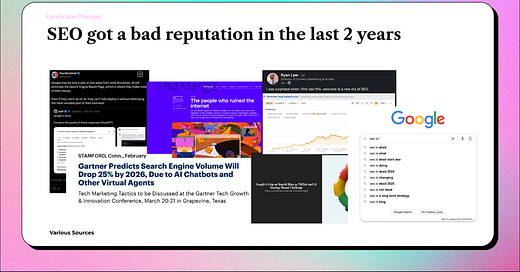


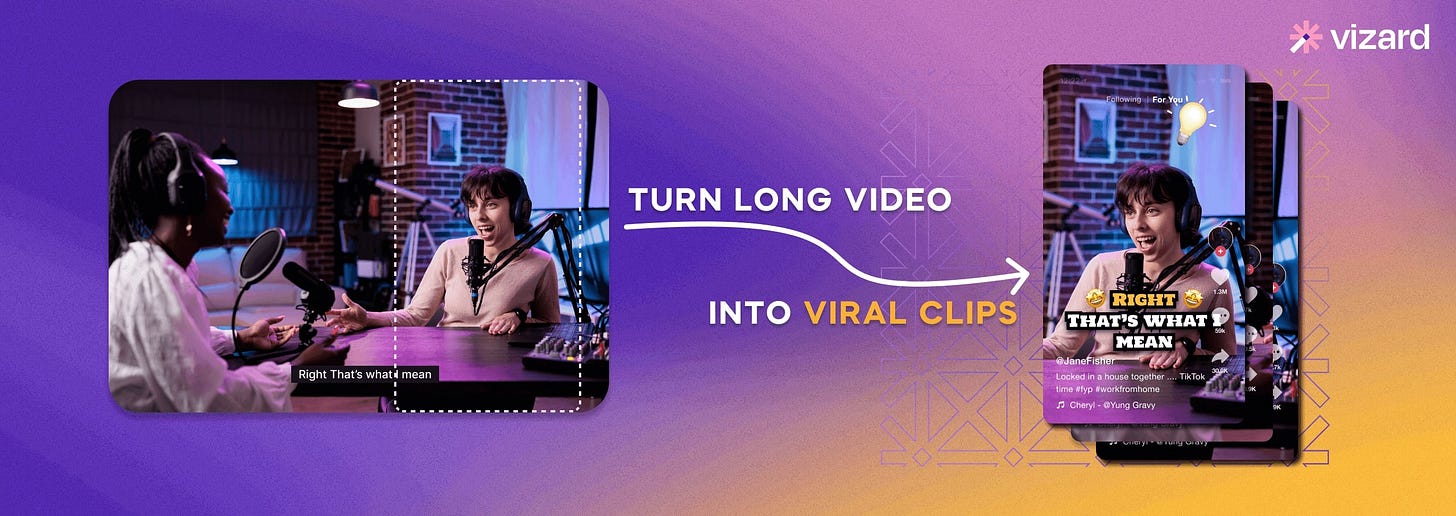
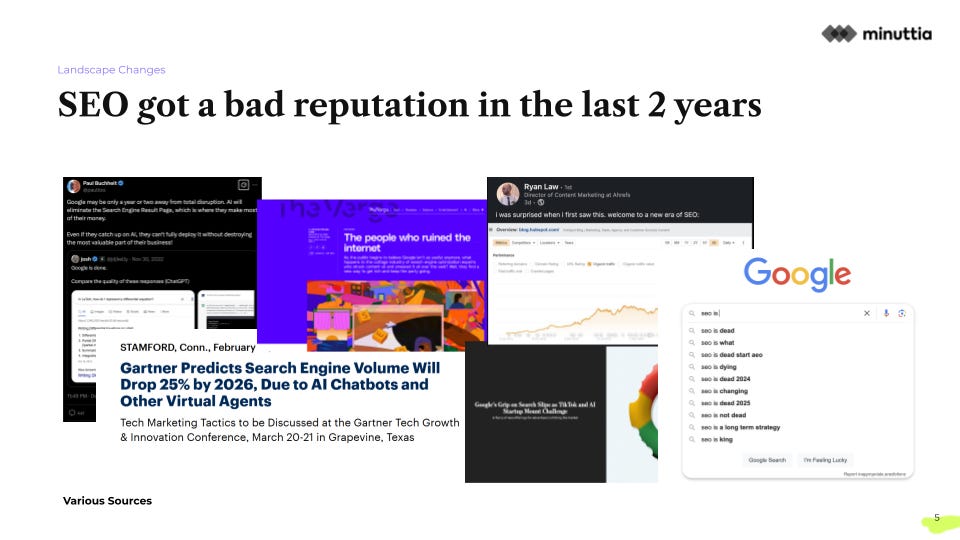
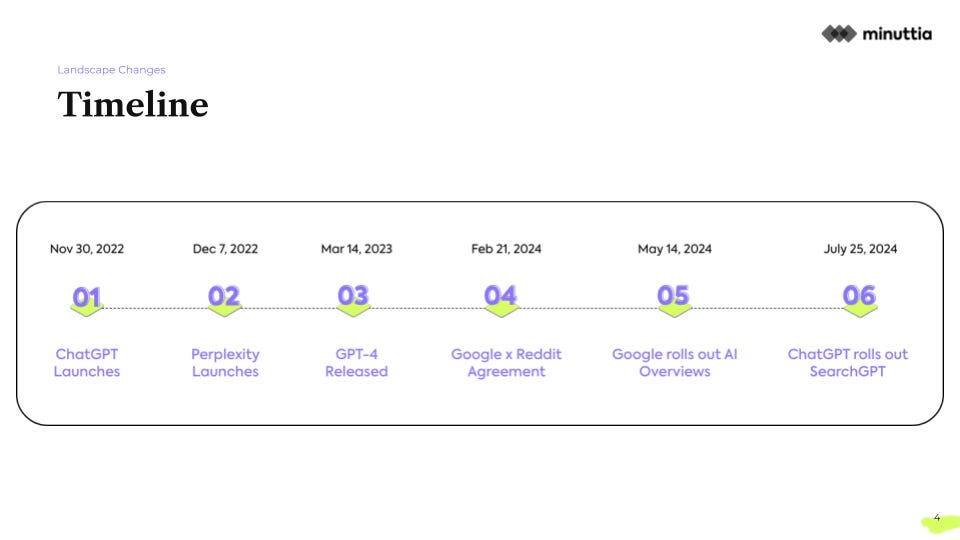
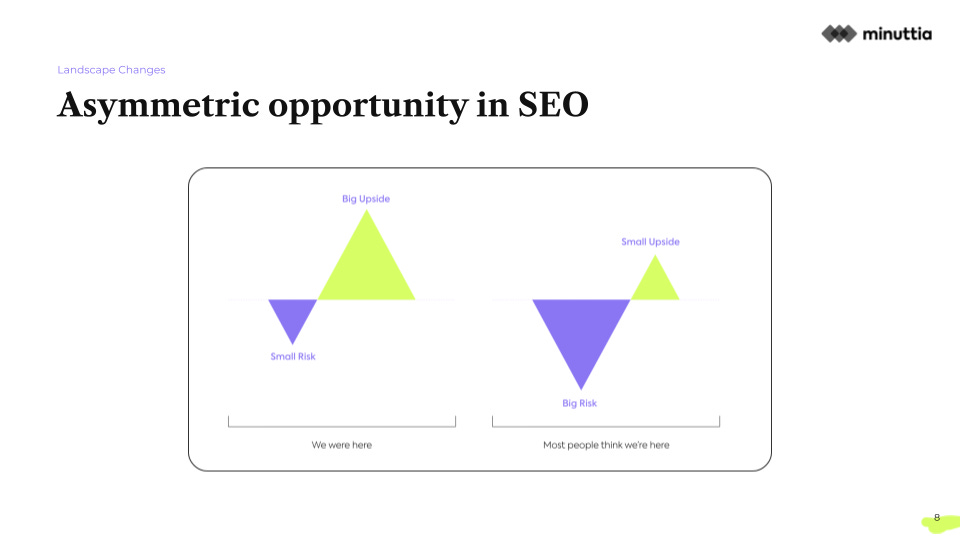
That's one of the reasons I don't call myself an SEO anymore.
Frankly, I disagree. It looks to me that the endgame for Google is to create a walled garden.